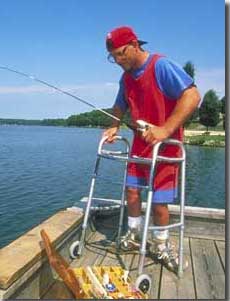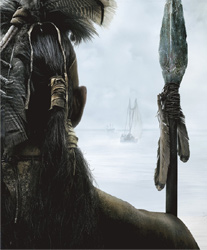|
"Virginia is for Lovers" recently celebrated its 35th Anniversary! The reason for the slogan's longevity and popularity is that it truly describes Virginia's natural splendor, exciting experiences and distinct, beautiful seasons. It also describes the warm, friendly and diverse people that live and travel throughout Virginia and make it so rare and wonderful. This includes people of all abilities, including those of us with mobility, visual and hearing disabilities.
More and more lodging establishments, attractions and events now think "ADA-compliant. " This means that they want to comply with the guidelines set forth by the American with Disabilities Act, which prohibits discrimination and ensures equal access to state and local government services, public accommodations, commercial facilities and transportation. You can read more on ADA requirements at the U.S. Department of Justice ADA site.
The Virginia Travel Guide for Persons with Disabilities
Now in its 5th edition, The Virginia Travel Guide for Persons with Disabilities describes the accessibility features of travel attractions, accommodations, activities and dining establishments statewide. The guide is designed to meet the needs of mobility-impaired as well as visually and hearing-impaired travelers. Facility descriptions range from specific measurements of door widths to availability of Braille menus and signing interpreters.
First-Hand Experience
 |
Lake Anna State Park in Northern Virginia
|
According to Cheryl and Bill Duke, cowriters of The Virginia Travel Guide for Persons with Disabilities , many travelers and their companions find it difficult to obtain pertinent information prior to their trips. Their son, Paul sits in a 400-pound electric wheelchair that cannot be lifted up and over "just a few steps." He needs to know if doors and aisles are wide enough for his wheelchair, too. The Virginia Travel Guide for Persons with Disabilities catergorizes accessible places around the state and offers plenty of tips and recommendations for access-able destinations.
The Dukes founded The Opening Door Inc. , an organization of volunteers who research, report and educate travelers and the tourism/hospitality industry about the needs of more than 54 million Americans who live with disabilities.
Traveling with a disabled child requires more than the typical amount of preparation. "But the pleasures are worth it," says Bill Duke, who with his wife, Cheryl, opened the world for their child to experience.
Travel Tips for Persons with Disabilities
Following are just some of the questions to ask when planning a trip. For more information, visit the Society for Accessible Travel and Hospitality Website. SATH's mission is to promote awareness, respect and accessibility for disabled and mature travelers.
- How far from the entrance is the handicapped parking?
- Is there access to a lowered telephone, drinking fountain, light switches, thermostat and peep holes?
- Are the pool and other recreational facilities accessible? If so, how are they accessible?
- Is there enough room for the wheelchair or walker in the bathroom?
- Is there an interpreter to sign the performance for my child?
- What about flashing-light smoke alarms, TTY, phone flasher, knock lights, closed-captioned TV or decoder?
- What about Braille models of dioramas?
- What about audio descriptions of the displays?
|
| About 71 percent of persons with disabilities have taken a trip in the past two years. |
Those are just some of the questions that need to be answered before you venture out. And, like SATH's motto, "Disability is Not Inability!" |
